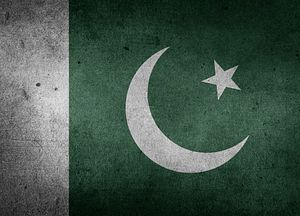Imran Khan, Pakistan’s new prime minister, has a first major political challenge on his hands. The challenge is a Tehreek-e-Labaik Ya Rasool Allah Pakistan (TLY) protest march toward Islamabad. The right-wing religious party is protesting against a blasphemous cartoon competition in the Netherlands.
On the part of the government, the action taken so far has been in the form of statements, condemning the controversial contest and promising to raise the issue at various international forums. The country’s Senate, a few days ago, unanimously passed a resolution condemning the contest. On Monday, the newly elected prime minister of Pakistan, Imran Khan, vowed to take the issue to the United Nations (UN) General Assembly in September and termed the event a “collective failure of the Muslim world.”
However, all of this has not had any impact on the TLY’s stance, which has termed the government’s policy ineffective to deal with the issue. TLY has threatened to stay in the streets until the Pakistani government severs diplomatic ties with the Dutch government and expels the Netherlands’ envoy from Pakistan. How Khan’s government negotiates with the TLY will determine the course of his government in the coming weeks and months.
A government team that has been negotiating with the leadership of the TLY has not been able to convince the latter. The government’s efforts to stop the TLY from taking to the streets have failed, which shows that the right-wing group is not willing to make a compromise. Moreover, it also shows that the religious group doesn’t have any soft spot for the current government of Imran Khan as had been speculated previously, when the same group took out a long march against the outgoing government of Nawaz Sharif. Khan’s Pakistan Tehreek-e-Insaf (PTI) also supported that previous protest.
The ongoing situation will test the newly elected government’s ability to handle an ideologically motivated protest. The PTI is equipped to take on any political opposition but when it comes to handling a charged situation — like one concerning the issue of blasphemy — the government doesn’t have much of space short of making a compromise with religious groups. However, the important question is: would it be a good idea to surrender the country’s foreign policy to a religious group with an isolated presence in just one provincial assembly of Pakistan? If the current government expels the envoy of Netherlands and severs ties with the European country, which are two demands of the TLY, it would simply mean that in the future, the government can easily give in to street pressures and make strategic decisions to appease radical groups.
Any decision by Khan that would damage Pakistan’s ties with the Netherlands under the pressure of a religious group would set a bad precedent at an early phase of the new government. For the TLY, it would mean that even with just two provincial assembly seats, the group has the ability to dictate the state and force it into compromise. If the government offers any more space to the radical group, the latter would not only attain an emboldened political position in the coming weeks and months but will also expand its demands beyond the issue of blasphemy.
The government should take the situation as a test case scenario. The national security establishment, which as of now doesn’t appear to have any confrontation with the government, should also view this as a challenge for its own counterterrorism plans in the country. The national security establishment of Pakistan should stand with the government in this situation in sending a strong message to the religious group, demonstrating that the state cannot be taken hostage by a handful of religious fanatics. However, it’s unclear if a military action will be on cards, for any such situation will only complicate Pakistan’s politics and aggravate the political situation domestically.
Currently, Pakistan cannot afford any political instability. With the new government attempting to take on pressing issues related to the country’s troubled economy and institutional reforms, all state institutions should be on one page when it comes to dealing with the ensuing situation in Islamabad.
At this point, Pakistan can afford neither surrender before a radical group nor political instability. Tough days are ahead for the current government.

































